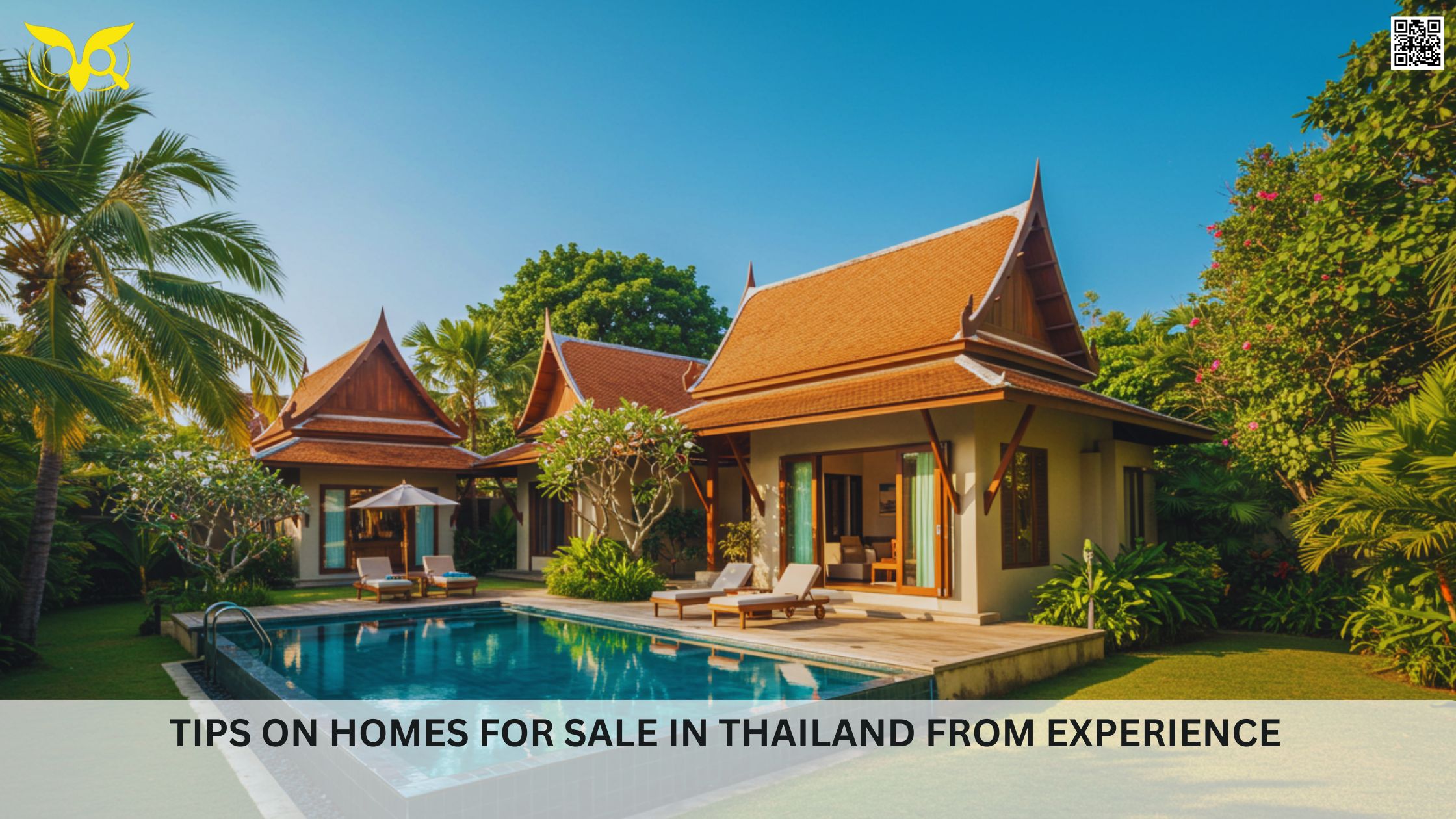
Hello, I’ve lived in Thailand for over a decade. When I first arrived, I was still working and am now retired here. My careers in aviation and yachts have taken me around the world many times. I chose Thailand for some of the same reasons you are looking to buy your home here.
It is amazingly beautiful here. Thai nature and environment are way beyond pleasant. Thailand is in the top three nations for its biodiversity. If you love nature, you will find new and striking flora and fauna in the Jurassic-like jungles, mountains, and breathtaking islands. I could dissolve into infinity on one small island I keep secret.
The people of Thailand are nonaggressive and very polite. In tourist-laden areas, the poor attitudes of foreigners seem to rub off and imprint on some Thai citizens an uncharacteristic nature of agro and spite. For this reason, I advise you to shop for house for sale thailand beachfront at a comfortable distance from tourist cities.
If there isn’t a local market, shop, or store that sells an item you want, most things can be delivered from online shopping. Some specific nostalgic ingredients may not be available at all. Have a friend back home send that to you or get creative. My first two years here, I clung to a steadily decreasing list of things I couldn’t get here until I accepted the different world I chose to live in completely. The best burger I’ve had in Thailand is at the Burger Shack operated by a Thai lady, on Koh Chang island.
Learn the culture first. The language will take time and use with your new Thai neighbours and friends who are all too happy to help you learn their language. However, our Western aggressive nature will prevent those relationships from even beginning. Come here as a child who is inquisitive, respectful, and attentive. Far too many foreigners come here and are degrading, insulting, and self-righteous. Living in harmony is possible, and it’s all up to you.
Most homes don’t have a clothes dryer or heater, and most kitchens are outside to keep heat, oil, and fumes out of the home. All floors are tile and beautiful rosewood or teak. When looking for your house, do not assume anything. Construction is nearly all concrete, plumbing, and electrical are done differently as well. Imagine that, in changing your life, some of your life will change.
It is of significant value to you in saving time and money to make a good relationship with a local real estate agent. Find one who has a long-functioning business and has developed excellent relationships with the government departments concerning home purchases. If you cannot confidently order a coffee in Thai, how can you expect to find and buy a home?
Homeownership is done differently for foreigners. You must understand how to secure your property investment. Like other nations, Thailand is protective of its people and land. Learning the laws here and how they differ from your birth nation is very important. Take the time to become informed from a professional source of information. See you on the beach soon.
Source: https://baddiehub.news
Why buying property in Thailand can feel overwhelming
When I first thought about buying a home in Thailand, my head was spinning. There were so many questions that kept coming up. Is it even legal for foreigners to own property here? What’s the safest way to transfer money? How can I be sure the property isn’t in some sort of legal dispute? And what if I accidentally fall for one of those too-good-to-be-true deals?
I know I’m not the only one who’s felt this way. In fact, nearly everyone I’ve spoken to who considered investing in Thai real estate had the same fears. The process isn’t the same as back home. From confusing laws to language barriers and hidden fees, the concerns are real. But once I started asking the right questions, connecting with the right professionals, and understanding the system, everything got a lot clearer—and a lot less stressful.
What makes buying property in Thailand worth it
Let’s start with the good news. There are a lot of upsides to owning a home in Thailand. The cost of living is lower than in many Western countries, yet the lifestyle is rich. You get warm weather year-round, access to beautiful beaches or lush mountains, and communities that are both local and expat-friendly.
For many people, the idea of retiring here or owning a holiday home becomes more than just a dream once they understand how accessible it can be. A condo in Chiang Mai or Hua Hin, for example, can cost significantly less than a studio apartment in a big European or American city. You’re not just buying bricks and mortar—you’re buying a lifestyle.
Key benefits of owning a home in Thailand:
- Competitive property prices compared to Western countries
- Wide range of locations from beachfront to mountain views
- Lower maintenance and utility costs
- Expat communities that help ease integration
- Access to healthcare and international schools
- Option to rent out property for passive income
Can foreigners own property in Thailand?
This is the question I hear the most. Technically, foreigners can’t own land outright in Thailand, but they can own buildings and condominiums. So, if you’re buying a standalone house, you’ll usually lease the land it’s on, or set up a legal structure to allow indirect ownership.
If you’re looking at condos, it’s a lot simpler. Foreigners can own up to 49% of the total floor space in a condominium building. That’s a lot more straightforward and common among expats.
Common ownership options for foreigners:
- Freehold condominium ownership (most straightforward)
- Leasehold agreements (typically 30 years, renewable)
- Setting up a Thai company (needs proper legal structure and Thai shareholders)
- Thai spouse ownership (with legal agreements in place)
What type of properties are available?
Thailand’s property market is surprisingly diverse. Whether you’re looking for a modern condo in Bangkok, a beachfront villa in Phuket, or a cozy bungalow in Chiang Mai, the options vary widely by location and budget.
| Property Type | Typical Locations | Approximate Cost (THB) | Notes |
|---|---|---|---|
| Condo | Bangkok, Pattaya, Chiang Mai | 1.5M – 15M+ | Easy for foreigners to buy |
| Villa | Phuket, Koh Samui, Hua Hin | 5M – 50M+ | Usually requires leasehold or company setup |
| Townhouse | Suburban Bangkok, Chiang Mai | 2M – 8M | Often in gated communities |
| Land plot | Rural areas | Varies widely | Not available for direct foreign ownership |
Which areas are most popular among expats?
Where you choose to live depends a lot on your lifestyle. I’ve spent time in several areas across Thailand, and each has its own charm—and challenges.
Popular cities and what they offer:
Bangkok
- Best for: work opportunities, international schools, urban lifestyle
- Challenges: traffic, pollution, higher costs
Chiang Mai
- Best for: peaceful living, affordability, creative scene
- Challenges: seasonal air quality issues (burning season)
Hua Hin
- Best for: retirees, beach access, quieter pace
- Challenges: limited nightlife
Phuket & Koh Samui
- Best for: island living, luxury villas, tourism rental market
- Challenges: more expensive, some areas too touristy
Pattaya
- Best for: beach and city blend, nightlife, value-for-money condos
- Challenges: reputation, can feel overcrowded in high season
What to look for when inspecting a property
When I went property hunting, I learned quickly that appearances can be deceiving. A beautiful exterior might hide plumbing issues or poor insulation. Don’t just fall for pretty views—dig into the structure and location.
Here’s what I always check:
- Legal status of the property (title deed, building permit)
- Land encroachment issues (especially in rural or beachfront areas)
- Flood risk or water drainage problems
- Distance to hospitals, supermarkets, and transport
- Airflow and sunlight in the unit
- Noise levels (especially near bars or busy roads)
- Water pressure and plumbing system
- Security in the building or neighborhood
Is it better to buy new or resale?
I’ve explored both, and each has its perks and pitfalls.
New Developments
- Pros:
- Modern amenities
- Developer warranties
- Sometimes lower entry costs (pre-launch prices)
- Cons:
- Construction delays
- Smaller living spaces
- Less character in design
Resale Homes
- Pros:
- Bigger floor plans
- Established neighborhoods
- Potential for negotiation
- Cons:
- Higher maintenance costs
- May need renovation
How to avoid common mistakes
I’ve seen people rush into a purchase after falling in love with a property on vacation. That’s rarely a good idea. You need to understand the legal landscape and get professional help.
Mistakes to avoid:
- Buying without a property lawyer
- Not translating Thai documents
- Ignoring due diligence
- Paying money before seeing official papers
- Skipping a home inspection
- Assuming verbal agreements are binding
Who do you need on your side?
The right team makes a world of difference. Don’t rely solely on what the developer or agent says. Here’s who helped me the most:
- Property lawyer fluent in Thai and English
- Licensed real estate agent with experience in your target area
- Independent inspector to assess property condition
- Currency exchange specialist for better transfer rates
What does the buying process look like?
It might seem daunting, but once you break it down, it’s manageable.
Step-by-step breakdown:
- Find a property that fits your goals
- Check legal documents and ownership history
- Sign a reservation agreement and pay deposit (typically 5-10%)
- Draft and sign the sale agreement
- Transfer funds through legal channels (usually to a Thai bank)
- Transfer ownership at the Land Office with all parties present
- Pay taxes and fees (usually split between buyer and seller)
What about taxes and fees?
You’ll need to factor in several costs beyond the purchase price.
| Expense Type | Who Pays | Approx. Rate |
| Transfer Fee | Buyer/Seller | 2% of property value |
| Stamp Duty | Seller | 0.5% (if no VAT applies) |
| Withholding Tax | Seller | Depends on tenure/price |
| Legal Fees | Buyer | Varies (15,000+ THB avg) |
| Common Fees (condo) | Buyer | ~30-50 THB/sqm/month |
What about long-term living or renting it out?
Many expats either live full-time in their Thai home or rent it out when they’re away. Rental income can be a great bonus, especially in tourist-heavy locations.
Just remember:
- Rental income is taxable in Thailand
- You may need a local agent to manage the property
- Short-term rentals (like Airbnb) are restricted in some areas/buildings
Real experiences make all the difference
Talking to other foreign homeowners helped me more than anything. I learned about scams to watch for, reliable agents, and which areas offered the best value. One couple I met in Chiang Rai bought land through a Thai friend—only to find out later the land was part of a disputed inheritance. It cost them years in legal battles.
Meanwhile, another expat I know bought a resale condo in Bangkok with help from a good lawyer and now rents it out long-term, covering all his costs and turning a small profit.
Final thoughts
Buying property in Thailand isn’t without its challenges, but it’s absolutely doable with the right preparation. Learn the laws, understand your rights, and get local help. Don’t rush. Visit multiple times if you can. And never pay before the paperwork is fully verified.
It’s not just about owning a house—it’s about feeling at home.






